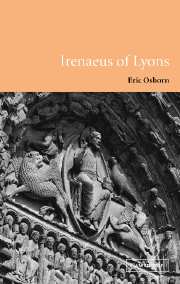Book contents
- Frontmatter
- Contents
- Preface
- List of abbreviations
- Chapter 1 Irenaeus: argument and imagery
- Part I DIVINE INTELLECT
- Part II ECONOMY
- Chapter 3 One creator: ut sapiens architectus et maximus rex
- Chapter 4 Economy: God as architect of time
- Part III RECAPITULATION
- Part IV PARTICIPATION
- Part V CONCLUSION
- Appendix: Gnosticism
- Select bibliography
- Citations from Irenaeus
- Citations from the bible
- Index of classical authors
- Index of patristic authors
- General index
Chapter 3 - One creator: ut sapiens architectus et maximus rex
Published online by Cambridge University Press: 22 September 2009
- Frontmatter
- Contents
- Preface
- List of abbreviations
- Chapter 1 Irenaeus: argument and imagery
- Part I DIVINE INTELLECT
- Part II ECONOMY
- Chapter 3 One creator: ut sapiens architectus et maximus rex
- Chapter 4 Economy: God as architect of time
- Part III RECAPITULATION
- Part IV PARTICIPATION
- Part V CONCLUSION
- Appendix: Gnosticism
- Select bibliography
- Citations from Irenaeus
- Citations from the bible
- Index of classical authors
- Index of patristic authors
- General index
Summary
Irenaeus' account of the divine Intellect declares God's undivided unity and universal goodness. It ends with the distinction between God who makes and man who is made, between God who does good and man to whom good is done. Man, found in God, will always be advancing to God. This movement defines the economy of salvation which begins with creation.
Creation is a difficult concept, for it uses the notion of causation outside the process of the world whence that notion derives and wherein it makes sense. We speak of causes in order to understand the relation between parts of the world; to lift the idea outside the world and apply it to the undifferentiated whole is a strange move, rather like asking, ‘Is this man a foot?’ Yet the question ‘Why does anything exist?’ has long been taken seriously. Monotheism, especially in its Judaeo-Christian form, declares God to be sole cause of all that is.
How can sense be made of this kind of causation?
TWO ANALOGIES—WISE ARCHITECT AND SOVEREIGN KING
The making of a universe differs from the making of a cake, yet accounts of creation commonly set out steps which are more culinary than conceptual. Irenaeus begins with two images which have been used to relate the world to one first cause. The architect/builder produces order from disorder. The monarch/magician produces by word, will and power. The two images may conflict – one presupposes matter and the other does not.
- Type
- Chapter
- Information
- Irenaeus of Lyons , pp. 51 - 73Publisher: Cambridge University PressPrint publication year: 2001

